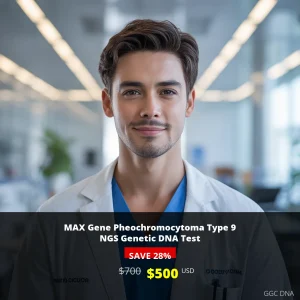KRAS Mutation Screening Codons 12 & 13
Understanding KRAS Mutation Screening
The KRAS Mutation Screening Codons 12 & 13 test represents a crucial advancement in personalized cancer medicine. This specialized genetic analysis focuses on detecting specific mutations in the KRAS gene, which encodes a protein that plays a fundamental role in cell signaling pathways regulating cell growth, division, and survival. When mutations occur at codons 12 and 13 of the KRAS gene, they can lead to uncontrolled cell proliferation and contribute significantly to cancer development and progression.
What Does the Test Measure?
This comprehensive screening test specifically targets and analyzes:
- Mutations at codon 12 of the KRAS gene
- Mutations at codon 13 of the KRAS gene
- Specific amino acid substitutions that activate the KRAS protein
- Genetic alterations that affect response to targeted therapies
The test utilizes advanced Sanger Sequencing technology, considered the gold standard for mutation detection, ensuring high accuracy and reliability in identifying these critical genetic changes.
Who Should Consider KRAS Mutation Screening?
Clinical Indications and Patient Profiles
This test is particularly recommended for patients with:
- Colorectal cancer diagnosis
- Non-small cell lung cancer
- Pancreatic cancer
- Other solid tumors where KRAS status impacts treatment decisions
- Patients being considered for EGFR inhibitor therapy
- Individuals with family history of relevant cancers
Symptoms and Clinical Scenarios
Patients experiencing symptoms such as unexplained weight loss, persistent abdominal pain, changes in bowel habits, chronic cough, or other cancer-related symptoms should discuss KRAS testing with their healthcare provider, particularly when:
- Planning targeted therapy treatment
- Assessing eligibility for clinical trials
- Evaluating prognosis and treatment response
- Managing recurrent or metastatic disease
Benefits of KRAS Mutation Screening
Personalized Treatment Planning
Understanding your KRAS mutation status provides numerous clinical benefits:
- Treatment Selection: Determines effectiveness of EGFR inhibitor therapies
- Prognostic Information: Helps predict disease course and outcomes
- Clinical Trial Eligibility: Identifies patients for targeted therapy trials
- Cost-Effective Care: Avoids ineffective treatments and associated side effects
- Comprehensive Cancer Management: Supports multidisciplinary treatment decisions
Enhanced Patient Outcomes
By identifying KRAS mutations, healthcare providers can:
- Tailor treatment regimens to individual genetic profiles
- Improve response rates to appropriate therapies
- Reduce unnecessary treatment-related toxicity
- Optimize healthcare resource utilization
- Provide more accurate prognostic counseling
Understanding Your Test Results
Interpreting KRAS Mutation Status
Your test results will fall into one of the following categories:
Wild-Type KRAS (No Mutation Detected)
This result indicates that no mutations were found at codons 12 or 13 of the KRAS gene. Patients with wild-type KRAS may be candidates for EGFR inhibitor therapies and typically have better response rates to certain targeted treatments.
Mutant KRAS (Mutation Detected)
A positive result indicates the presence of specific mutations at codons 12 or 13. This finding suggests that EGFR inhibitor therapies may be less effective, and alternative treatment strategies should be considered. Your healthcare provider will discuss the specific mutation identified and its clinical implications.
Clinical Implications
It’s essential to discuss your results with your healthcare team, who will:
- Interpret results in the context of your specific cancer type and stage
- Discuss implications for current and future treatment options
- Provide guidance on monitoring and follow-up care
- Address any questions or concerns about your genetic profile
Test Details and Pricing
| Test Component | Details |
|---|---|
| Test Name | KRAS Mutation Screening Codons 12 & 13 |
| Regular Price | $350 USD |
| Discount Price | $262 USD |
| Turnaround Time | 7-8 Days |
| Sample Type | Tumor Tissue (Paraffin Embedded Tissue Blocks) |
| Testing Method | Sanger Sequencing |
| Specialty | Cancer Genetics |
Pre-Test Instructions and Requirements
Prescription Requirements
The KRAS Mutation Screening (Codons 12 & 13) test requires a Doctor’s prescription for most cases. However, prescription requirements do not apply to:
- Surgery cases
- Pregnancy-related testing
- Individuals planning international travel
Sample Collection
This test requires tumor tissue samples, specifically paraffin-embedded tissue blocks from previous biopsies or surgical procedures. Your healthcare provider will coordinate sample submission through our network of affiliated pathology laboratories.
Nationwide Testing Availability
We proudly serve patients across the United States with convenient testing locations in all major metropolitan areas including:
- New York City and surrounding regions
- Los Angeles and Southern California
- Chicago and Midwest locations
- Houston, Dallas, and Texas facilities
- Miami, Orlando, and Florida centers
- Philadelphia, Boston, Washington DC, and East Coast locations
- San Francisco, Seattle, and West Coast facilities
Our extensive network ensures that patients nationwide have access to this critical genetic testing with consistent quality standards and reliable turnaround times.
Take the Next Step in Your Cancer Care Journey
Don’t leave your treatment decisions to chance. Understanding your KRAS mutation status can significantly impact your cancer treatment outcomes and quality of life. Our discounted pricing at $262 USD makes this essential testing accessible to patients across the country.
Ready to schedule your KRAS Mutation Screening? Contact our genetic counseling team today to discuss your testing needs and schedule your appointment.
Call or WhatsApp: +1(267) 388-9828
Our experienced genetic specialists are available to answer your questions, explain the testing process, and help you understand how KRAS mutation screening can benefit your specific situation. Take control of your cancer care with comprehensive genetic insights from GGC DNA.






